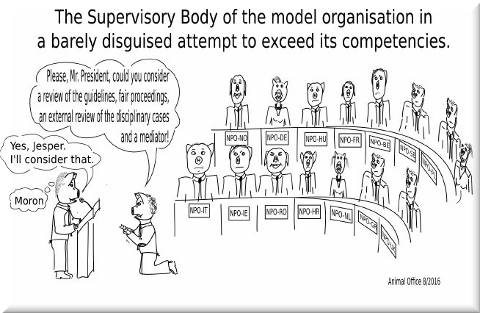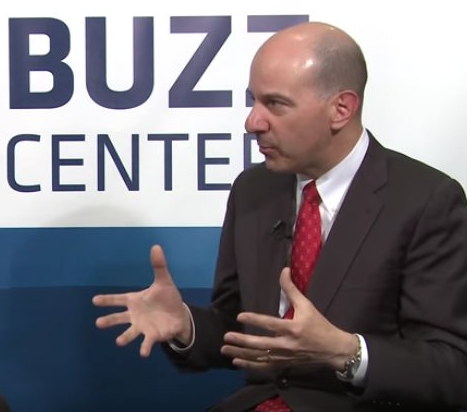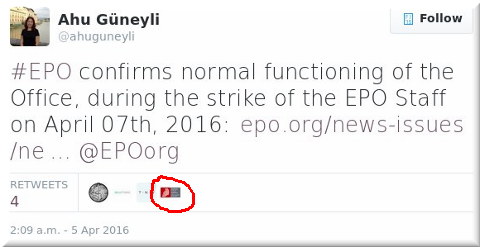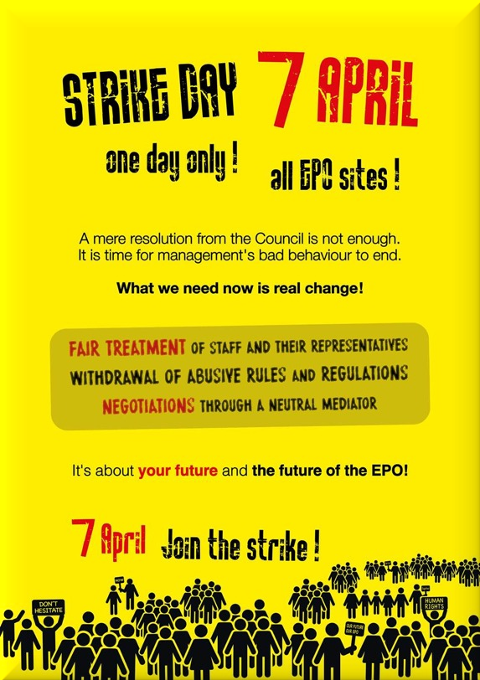04.05.16
Posted in Europe, Law, Patents at 7:49 pm by Dr. Roy Schestowitz
The European Patent Office (EPO) is now the antithesis of justice

Summary: The European Patent Office continues to stomp on justice and even on judges — a fact that evades nobody who bothers looking at the pertinent facts
TECHRIGHTS is disturbed (albeit not surprised given the EPO's record with the law) to come to grips with the fact that for nearly a year and a half a judge has been suspended and in spite of the Board (both of them, board of appeal and Board 28) and the Council telling off Battistelli for his abuse of justice (they put it more politely as they tiptoe) the judge remains suspended. The other day someone sent us some text that suggests bringing back the suspended judge, who was put on 'house ban' against the rules of the EPO (Battistelli later changed the rules to better defend his abuses). That would at least restore some confidence in EPO management and show that it regrets suspending justice itself. For those who don’t know, the judge is alleged to have shown judgments or charges against management, which was thus unsuitable to serve. In other words, the judge was a sort of whistleblower (hoping to uphold the law or persuade others to do so). Here is the text explaining the situation from start to finish (present), including the chilling effect it led to (imposing blind obedience through fear):
The thin independence of DG3
In its ruling R19/12 of May 2014, the Enlarged Board of Appeal found that the executive functions of the Vice-President of DG3 were incompatible with his judiciary function as, Chairman of the Enlarged Board. In response, Mr Battistelli relieved VP3 of most of his executive functions flowing from Article 10(3) EPC. He furthermore put all DG3 members directly under his authority for administrative requests (duty travel, approval of lectures, side activities etc.). This clearly infringes upon the independence of the Board members.
A further attack on the independence of DG3 occurred in December 2014 when a Member of the Boards of Appeal was subjected to a “house ban” by the President. The initial accusation was defamation of VP4. As usual these days, further accusations were added during the procedure. A first request to the Enlarged Board of Appeal to propose his removal from office was rejected by the Enlarged Board of Appeal after a hearing in September 2014 on the grounds that the accusations were insufficiently substantiated. In the October meeting of the Administrative Council, Mr Battistelli asked the Council to dismiss the colleague concerned without the required proposal of the Enlarged Board. The Council refused and instead decided to submit a second request to the Enlarged Board to propose removal from office. During a second hearing before the Enlarged Board in February, the representatives of the Council withdrew their second request. The correct thing to do now would be to lift the suspension and reinstate the colleague concerned. In the mean time, Mr Battistelli persuaded the Council to change the law governing suspensions. In December last year a majority of the delegates voted in favour of CA/D 18/15 [NL and DE voted against; FR GR SE and SK abstained]. This amendment to the ServRegs gives the Council the power to suspend a member of the EPO’s judicial branch (i.e. members of 9the Boards) on a salary reduced by up to 50% for up to 24 months – or even longer in “exceptional cases”. The amendment applies in a retroactive manner to the pending DG3 case. Aside from the question concerning the legality of such retroactive application, the measure has a negative impact on the independence of DG3 as a whole. The Council has now granted itself the power – whether acting alone or in concert with the President – to sideline any “irksome judge” without the need to observe due process by following the procedure foreseen in Article 23(1) EPC.
The next attack is possibly in preparation, with the so-called proposal for a structural reform of the EPO Boards of Appeal. An internal working group, the DG5 task force, had been entrusted with the mission of drafting the proposal. However, faced with the manifest unwillingness of the Office to propose measures really improving the independence of the Boards and with massive headwind from interested circles, the Council obliged the President to withdraw his orientation paper CA/98/15 and decided to take over in December. A status report is foreseen for the March Council meeting, with more concrete measures for the June meeting. However, the five “main points” of the reform, as sketched by the Swiss delegation during the December meeting , do not necessarily bode well for the future.
Using the Animal Farm theme (book reference for the uninitiated), the following cartoon/caricature has been issued and yes, it alludes to Hardon, who is alleged to have spoken to the above judge in an effort to help uphold justice. Based on recent reports, they now have the same lawyer. The cases are similar and intertwined only in a few ways (like the ‘sexed up’ charges, which help distract from the real reason for suspension and/or dismissal).
At the EPO, you see, those who pursue justice have justice bent against them, in an effort to simply silence them. How can anyone not consider this worthy of a strike — one that explicitly calls for the restoration of justice at the EPO? Even the Council recognises that this is a problem, as per its last meeting’s formal notes. █

EPO ‘justice’ — only the pension restored by Battistelli in an effort to salvage his job (as time is running out for Battistelli and he may soon come under more attacks from Board 28)
Permalink
 Send this to a friend
Send this to a friend
Posted in Europe, Patents at 7:23 pm by Dr. Roy Schestowitz
Original/English
Publicado en Europe, Patentes at 8:32 pm por el Dr. Roy Schestowitz
Si parece un golpe de estado, entonces…

Fuente: Interview from last summer
Sumario: El circulo intimo de la Oficina Europea de Patentes se incrementó, mientras que más gente conectada a Battistelli disfruta una ventaja extraordinaria para asumir altos cargos, consólidando el golpe de estado
Le président de l’OEB, Benoît Battistelli, no suelta la soga y no va a renunciar. Mientras más permanesca en el poder, peor se van a poner las cosas (hay una huelga esta semana).
Fuentes nos dicen que las cosas se exacerbaron más aún bajo el reinado de hierro de Battistelli. Su circulo se está expandiendo, so la maraña se enreda aún mas, así que en el futuro será más difícil arreglarlo todo. Para un resumen del increíble rápido ascenso al poder de Bergot, vean parte una, parte dos, parte tres, y parte cuatro de una vieja series de artículos (hay incluso aspectos matrimoniales en ellos). También recuerden a Lefevre [1, 2, 3] cons su asombrósa serie de promociones; ella fue encargada del desafío de hacer parecer que los empleados estaban felices cuando en realidad era lo contrario. Eso es más desafíante que tratar de hacer que los Afganos esten agradecidos después de que su país fué brutalmente invadido por una supuesta docena de ´secuestradores´ Saudíes.
“Así que el jefe tribal, Battistelli, continúa rodeándose a sí mismo de más caras familiares.”De todas maneras, vayamos al punto. He aquí una actualización acerca del círculo íntimo de Battistelli.
“En El Círculo Intimo 2.0 [PDF], Nadia Lefèvre y Raffaella de Greiff parecen ser cercanas a Elodie Bergot,” un lector nos dijo. “Reciéntemente Nadia Lefèvre se convirtió en directora. En April 1, Raffaella de Greiff también se convirtió en directora, lo que corresponde a grado A5. Parece otra carrera cohete. Ella entró a la EPO en grado A2 el 2011, y trabajo como consejera de Željko Topić.”
Así que el jefe tribal, Battistelli, continúa rodeándose a sí mismo de más caras familiares. Es una camara de resonancia, donde nadie lo encarará o dirá la verdad. (como el Emperador está Desnudo) y en su lugar le dirán sólo cosas que el quiera oír. El ya está actuándo como alguién que necesita estar en un asylo mental y considerando su edad (retiro) talvez este diágnostico no esté muy lejos (algúnas personas abiertamente desafían su estado mental) Consideren las siguientes observaciones:
La Alta Gerencia
El Servicio de Regulación de EPO se establece que “Un empleado permanente será jubilado de oficio el último día del mes en que cumpla la edad de sesenta y cinco años” (Art. 54 (1) (a)). Una prolongación hasta el 68 es, sin embargo, es posible “si la autoridad nominadora lo considere justificado en interés del servicio.” Tenemos la impresión de que las solicitudes de los miembros del personal ordinario de continuar trabajando después de los 65 que se rechacen de forma casi sistemática. Sin embargo, para la alta dirección, aparentemente se aplican otras reglas. Al final de su mandato, el Presidente será de sólo dos semanas antes de cumplir 68 años. Sr. Minnoye será de 70 años de edad cuando su contrato termina en diciembre de 2018.
La pregunta interesante es: no el Consejo sabe su edad cuando se decidió en la prórroga, o son los delegados prudente, puesto que algunos de ellos todavía están compitiendo por un puesto de trabajo en el OPO a pesar de su edad relativamente avanzada?
Battistelli es no sólo un megalomaniaco; también es un paranoíco y resulta ser desperdiciador (desague de presupuesto). El ha estado caminando con su Guardia Pretoriana por más de una década y aparentemente Bergot (el supuesto overachiever) también. Considerén el siguiente cucharadita:
¿Dónde está el peligro?
El Sr Battistelli reciéntemente confirmó que tiene guardaespaldas. El rumo también es que lo mismo sucede con la Srta Bergot. El Sr Battistelli esto es por los presentes riésgos de seguridad en Francia.
La suguiente link parece sugerir lo contrario:
http://condat.blogspot.com/2004/07/premier-show-public-de-m-benot.html
“BATTISTELLI se lève, ses deux gardes du corps le suivent. Le concert est fini. L’invité nous a montré qu’il était capable de parler brilliamment d’un sujet qu’il connaissait depuis 53 jours. Note d’ensemble: 4/20.”
Incluso si Battistelli va a renuciar alguna vez o sera despedido, un montón de trabajo tiene que ser hecho para restaurar la integridad de los recursos humanos de la EPO. !Qué tal desorden! Luego esta el asunto de obedecer la ley.
“Incluso si Battistelli va a renuciar alguna vez o sera despedido, un montón de trabajo tiene que ser hecho para restaurar la integridad de los recursos humanos de la EPO.”Como este nuevo comentario lo puso temprano anoche: “La solución del problema de la EPO-me parece muy simple. Battistelli debe comenzar a firmar el Convenio Europeo de Derechos Humanos (CEDH) (formalmente el Convenio para la Protección de los Derechos Humanos y de las Libertades Fundamentales) .Eso es un tratado internacional para proteger los derechos humanos y las libertades fundamentales en Europa. Elaborado en 1950 por el Consejo entonces recién formado de Europa, [1] La Convención entró en vigor el 3 de septiembre de 1953. Todo Consejo de Europa los estados miembros son parte de la Convención y se espera que los nuevos miembros a ratificar la Convención lo antes posible. [2]. El derecho en el OPO debe ser igual a la derecha en los países europeos. Battistelli puede decirnos por qué no?
“El Convenio estableció el Tribunal Europeo de Derechos Humanos (TEDH). Cualquier persona que siente sus derechos han sido violados bajo la Convención por un Estado parte puede llevar un caso a la Corte. Sentencias según las violaciónes son vinculantes para los Estados interesados y se ven obligados a ejecutarlos. El Comité de Ministros del Consejo de Europa supervisa la ejecución de las sentencias, en particular para asegurar el pago de los importes fijados por la Corte a los solicitantes en compensación por el daño que han sufrido. [3] La creación de un Tribunal de proteger a las personas de violaciónes de los derechos humanos es una característica innovadora de una convención internacional sobre los derechos humanos, ya que da al individuo un papel activo en el ámbito internacional (tradicionalmente, sólo los estados son considerados actores en el derecho internacional). La Convención Europea sigue siendo el único acuerdo internacional de los derechos humanos que proporciona un alto grado de protección individual tales. Los Estados Partes también pueden llevar los casos contra otros Estados partes de la Corte, aunque rara vez se utiliza este poder”
“Por extensión, como cuestión de hecho, Battistelli ha tenido un efecto perjudicial (efecto desacreditar) en la Unión Europea, por lo tanto, lo que hizo mucho para hacer daño “Comunidad” y “unidad” (UPC es un nombre engañoso, al igual que “la patente comunitaria “., donde la comunidad que se sirve es una comunidad de multimillonarios con innumerables paraísos fiscales).”de Red Hat ene Wildeboer escribió (como el actual gobierno/partido en el poder resultó ser un verdadero pirata, escondiendo dinero en paraísos fiscales): “Así que debe haber una nueva elección en #Iceland después #Panamaleaks es evidente que tendremos el primer país gobernado por el partido pirata.” (principal partido del país en los sondeos)
El presidente de la FFII (la FFII es históricamente cerca de Wildeboer) escribió en respuesta: “Islandia el primero en salir de la EPOrg?” Bueno, si se mantiene Battistelli, su falta de credibilidad podría conducir a ella. Battistelli daña la OEP más que nadie en estos días. A nadie le gusta depender de un hueco para el comercio / fines políticos / burocráticos. Por extensión, como cuestión de hecho, Battistelli ha tenido un efecto perjudicial (efecto desacreditar) en la Unión Europea, por lo tanto, lo que hizo mucho para hacer daño “Comunidad” y “unidad” (UPC es un nombre engañoso, al igual que “la patente comunitaria “, donde la comunidad que se sirve es una comunidad de multimillonarios con innumerables paraísos fiscales). █
Permalink
 Send this to a friend
Send this to a friend
Posted in Antitrust, Deception, GNU/Linux, Microsoft at 7:22 pm by Dr. Roy Schestowitz
English/Original
Publicado en Antitrust, Decepción, GNU/Linux, Microsoft at 9:02 pm por el Dr. Roy Schestowitz
Córtala o completamente acaba el marrulleo, Microsoft…
“Esta cosa anti-trust explotará. No hemos cambiado para nada nuestras prácticas de negocios.”
–Bill Gates
Sumario: Las proclamaciones de Microsoft “amor” hacia GNU/Linux no están siendo aceptadas por la comunidad, así que un montón de campaña de PR cae en oídos sordos (excepto aquellos que quieran ser engañados y diseminar aún mas la mentira, e.g. en las compañias de medios financiados o amigables a Microsoft)
EL siguiente mensaje fue publicado no hace mucho en Reddit. Es másc como un blog publicado como submisión en el sitio y es títulado “Recuérden: Microsoft es todavíá (y siempre lo será) hóstil hacia Linux y FLOSS”. Pensamos que vale la pena reproducirlo abajo (sin ninguno de los comentarios) porque alude a muchas cosas que hemos cubierto en este lugar, incluyendo el caso Comes vs Microsoft.
Con toda la “buena” PR y las noticias de Microsoft (aparentemente) se acercar a Linux, es fácil olvidar cómo Microsoft es hostil a Linux y todo el código abierto. Recuerden: Todo lo que hicieron fue conseguir un nuevo director general, la cultura de la compañía todavía es la misma.
Todo lo que ha cambiado es en lugar de odiar públicamente en Linux, Aman ahora públicamente Linux, pero en realidad siguen siendo muy hostiles a Linux. Esto nunca va a cambiar.
Sólo recuerde los archivos de casos de consumo de Iowa (http://edge-op.org/iowa/www.iowaconsumercase.org/), que tiene una gran cantidad de correos electrónicos internos de Microsoft, muchos de ellos básicamente declarar su amor por todas las cosas de Windows y MS y odio para todo lo demás. Todos se encuentran en formato PDF y se han desprecintado (por suerte). Algunos incluso entrar en detalles acerca de su trazado con cosas como el programa Vista Ready con el fin de engañar a los consumidores (que, básicamente, no dan una mierda), etc.
Entonces allí están los documentos Halloween: http://www.catb.org/esr/halloween/
De nuevo, tomen su decisiión – Consigan el FUD, cualquier cosa que escojan. Todo esta allí. Entonces esta lo de Ballmer “Linux es un cancer” etc.
Sí, sí, claro, estoy fuera de mi eje de balancín, esto fue hace todos los años, etc. Pero no es – Microsoft ODIA Linux, esto nunca va a cambiar! Una vez más, la única cosa que tiene el cambio es el CEO y como resultado, el PR. Es probable que encuentres que Nadella ha dicho internamente para todos “públicamente, nos encanta Linux y el software libre, a nivel interno sigue siendo como hasta ahora”; y cambiado la máquina PR como resultado.
Ahora bien, no sé qué Shuttleworth y Canonical están jugando en o qué beneficios pueden obtener de la oferta que hicieron, tal vez más cuota de mercado de Ubuntu (y dinero). Pero no bajar la guardia – Microsoft SIEMPRE odio Linux, incluso si usted no puede ver directamente.
¿De verdad cree que Bill Gates, aunque ya no sea presidente o CEO (que todavía trabaja allí Tho), que realmente dejar que su compañía, sus caminos, sus deseos y dirección, etc. todo vaya por el retrete y que alguien más venga y tomar todo en una nueva dirección? No se … Gates es muy inteligente y despiadado. Mucho más inteligente que eso. Sus / los “viejos” Microsoft maneras del negocio sucios están totalmente arraigados en la empresa. No solo cambio de CEO va a arreglar los caminos de la “vieja Microsoft”.
El “viejo Microsoft” sigue siendo el “nuevo Microsoft”, sólo la cara de la empresa ha cambiado – CEO y PR. Eso es. Microsoft, si pudieran presionar un botón y matar a Linux y a FLOSS durante durante la noche.
Recuerde las “patentes” que tienen que utilizarán para amenazar nuestras forma de desarrollo, aunque no directamente. Microsoft siempre va a ser hostil a Linux y el software libre. ¡RECUERDEN ESO!
Paul Venezia de IDG tiene un razonable buen artículo (él es pro-UNIX/Linux y siempre lo ha sido), el cual publicó esta mañana en InfoWorld. Para citar un poquito: “El hecho que Microsoft ahora soporte SQL Server en Linux no es realmente un desarrollo téchnico — es un movimiento de negocios. Afortunadamente para Microsoft, los ciégos de Ballmer se han ido, y la compañía puede ver que Linux es el OS de preferencia para nuestro futuro, no Windows. Microsoft perdió esa batalla hace tiempo. No sorprende, que los tipos del Azure cloud han tomado la iniciative en empujar Microsoft para apoyar a Linux (y otras tecnologías de open source relácionadas con el cloud, incluyendo Docker, Kubernetes, y varias NoSQL databases).”
“Microsoft no está amando o abrazando a GNU/Linux, excepto en el sentido E.E.E. (recuérden lo que la primera E significa).”Un resumen por Jim Lynch de IDG (también de InfoWorld) dijo más tarde (citando lo de arriba) que “Microsoft ha hecho reciéntemente movimientos para aceptar al Linux de una manera prominente, pero ¿ha tomado la compañía tanto tiempo para hacer esto? Un escritor de InfoWorld piensa que el Embrace de Microsoft hacia Linux pueda ser un poquito, y demasiádo tarde.”
Como explicamos hace un dia, hay un montón de mentiras provocativas Microsoft no está amando o abrazando a GNU/Linux, excepto en el sentido E.E.E. (recuérden lo que la primera E significa).
Hablándo de E.E.E., CSO (IDG) republica y luego se expande en Maria Korolov la propaganda de BlackDuck FUD contra FOSS al decir en lenguaje retórico (allí mismo en el titular) que hay algo malo en “la cálidad del código de open source code”. Black Duck (proviene de un personaje de marketing de Microsoft) es proclamado como sigue:
A medida que se crea el software de código abierto más, el número de vulnerabilidades aumenta también. Software de Black Duck está rastreando actualmente 1,5 millones de proyectos de código abierto.
Vulnerabilidades de código abierto pueden ser particularmente peligrosos, de acuerdo con el ‘vicepresidente de Estrategia de Seguridad Mike Pittenger de Black Duck. Software de código abierto puede ser ubicuo, dijo, y típicamente tiene ningún proceso en el que los parches se envían automáticamente a los usuarios.
Black Duck es de alguna manera similar a Xamarin en el sentido que actúa un poco como proxy de Microsoft. No sería posible sin el “embrace” (como en E.E.E.) de FOSS. Black Duck es una compañíá de software proprietario la que simplemente explota FOSS por mercadeo. Vean todo el largo mensaje arriba y dense cuenta de que estas tácticas no son nuevas en su totalidad. ¿Porqué los mismos errores de nuevo? Aprendan de la historia. █
“No animen nuevas, Java clases de platáformas múltiples, especialmente no ayuden que grandes implementaciones de Win 32 sean implementadas escritas/desplegadas. [...] Promuevan fragmentación del espacio classlib de Java.”
–Ben Slivka, Microsoft
Permalink
 Send this to a friend
Send this to a friend
Posted in Deception, Microsoft, Patents at 7:21 pm by Dr. Roy Schestowitz
English/Original
Publicado en Decepción, Microsoft, Patentes at 7:49 pm por el Dr. Roy Schestowitz
La última cubierta de IAM prácticamente lo dice todo…

Sumario: Propaganda Gratis para e más notorio troll de patentes del mundo de una reviast que es parcialmente financiada por tales trolles e incluso no los llama trolles (habitualmente usa eufemismos para lavar/limpiar su mala reputación)
IAM ‘magazine’, basado en sus vergonzosos anuncios de ayer, hace a Intellectual Ventures su historia de página principal esta vez, sin mencionar la palabra “T” word, como es usual (ellos siempre usan NPE).
“¿Cómo puede IAM esperart ser tratado seriamente por alguién (diferentes a trolles de patentes que adoran esta parcialización?” continúan negando la existencia de trolles y como hemos notado hace unos dias, un escritor que se está alejándose (basado en el anuncio de arriba) es editado por un ¨editor¨ en jefe que se niega tercamente a usar la palabra ¨troll¨ (WiLAN no es llamado troll en este su nuevo artículo). Bueno, los trolles son los que pagan/financian al ´magazine´, así que su imágen es embelleciad y hecha positiva (si algo existe) son acentuados con ástutas palabras y eufemismos en oraciones (como alterando lenguajes de dominación/ocupación con uno de defensa).
¿Cómo puede IAM esperart ser tratado seriamente por alguién (diferentes a trolles de patentes que adoran esta parcialización? █
Permalink
 Send this to a friend
Send this to a friend
Posted in America, Courtroom, Patents at 9:39 am by Dr. Roy Schestowitz

Source: 2013 interview
Summary: David Kappos has turned from Director of the USPTO into a raving proponent of software patents, to the point of discrediting Congressional intervention and corrective judgments from the highest court in the United States
Some public officials are acting like professionals (don’t mind EPO leadership). Some academics act professionally too. Professor Dennis Crouch, for instance, now finds himself growingly interested in the Supreme Court’s cases and he wrote about an upcoming event on Monday (Intellectual Property in the Supreme Court): “I’m looking forward to the Federalist Society teleforum this Friday, April 8, 2016 at 2:00 pm EST on the topic: Intellectual Property in the Supreme Court.”
“Mr. Kappos is a patent lawyer, a patents maximalist and increasingly a lobbyist for the rich and powerful.”With all its flaws notwithstanding, the Supreme Court of the US is reasonably important and quite highly regarded, especially or more so after Antonin Scalia died. Who would be silly enough to chastise the Supreme Court and even Congress? Apparently the former director of the USPTO. How tactless.
David Kappos complained about SCOTUS in New York a week ago. He doesn’t seem to accept the fact that software patents are dying in the US, owing to the historic judgment of the highest judges. Kappos is no judge and not much of an accomplisher either; he just spent many years at IBM, which is a software patents aggressor, then leaped into the USPTO, whose biggest client was IBM. Now he’s lobbying for software patents, profiting from software patents, and writing papers in favour of software patents. Here is his latest such move (“Law360 Opinion: Time For Congress To Leave The Patent System Alone, by David Kappos”).
“Maybe Kappos simply found out that there’s more money in fame and lobbying than there is in other jobs.”To quote Kappos: “The U.S. patent system has undergone a number of dramatic changes in recent years, including passage and implementation of the 2011 America Invents Act, six U.S. Supreme Court cases impacting patent laws, new administrative rules by the U.S. Judicial Conference, and actions by the Federal Trade Commission and state attorneys general. Many of these changes were needed to address abuses in the system, where frivolous patent suits have been used by “bad actors” to essentially extort payments from businesses after unfairly accusing them of infringement. However, the powerful effects from these changes undertaken by multiple branches of government strongly suggest Congress can prudently step back from further reshaping the patent system. It is time to let the system embrace its major recent changes and work out implementation issues before further reform is seriously considered.”
Mr. Kappos is a patent lawyer, a patents maximalist and increasingly a lobbyist for the rich and powerful. He even writes whitepapers in favour of software patents. When is this going to stop? It’s inapproriate as it makes both IBM and the USPTO look as though they intervene with policy and interfere with judge’s work, even Supreme Court Justices.
The other day patents maximalists (also huge proponents of software patents) noted that the “resignation of David Kappos [...] coincidentally happened shortly after he gave a strong pro-software patent speech.”
“How much further can one allow these opportunists to go?”Maybe Kappos simply found out that there’s more money in fame and lobbying than there is in other jobs. We truly hope he’ll stop. This discredits the whole framework of patents in the US.
According to this new article about PTAB the USPTO folks are trying to “tilt the playing field just a little bit back in their favour.” To quote the whole thing: “Since they came into force in September 2012 the post-issuance reviews introduced by the America Invents Act have helped make life far tougher for US patent owners. Last week, however, the USPTO announced some changes to the rules governing the process which just might tilt the playing field just a little bit back in their favour.”
How much further can one allow these opportunists to go? No doubt a lot of patent lawyers are concerned because more patents just mean more business to them, in the same sense that more wars mean more profit to arms manufacturers. “Several heads of new firms told C&E they’ve pursued patent protection despite business method and software patents facing greater scrutiny from the U.S. Patent and Trademark Office,” says this new article. It later blames Alice (at SCOTUS) by stating: “These moves fit a pattern, established by Audience Partners, of pursuing patents of processes that most people in the industry believe can’t be patented. Moreover, they’re coming in wake of Alice Corp. v. CLS Bank International, the June 2014 Supreme Court ruling that seemed to tighten eligibility while invalidating some software and business-method patents. In fact, the Software Freedom Law Center, which represents not-for-profit developers, said at the time that the decision was “one more step towards the abolition of patents on software inventions.” ”
“As the world moves further away from software patents (the US included) Kappos is working to do the very opposite.”Patent lawyers only pay attention to Alice when software patents withstand scrutiny, as another new article (“One-Court Alice Backlash: Delaware’s Judge Robinson, Critical of Recent Trends, Upholds Software Patents in Three Cases”) serves to show. To quote: “The trend? In applying § 101 since Alice Corp. Pty. Ltd. v. CLS Bank Int’l., 134 S. Ct. 2347 (2014), courts have given software patents a rough go of it. District courts frequently cite Alice to strike down software patents. And as Judge Robinson notes, the Federal Circuit, for its part, has not upheld a computer-implemented patent under § 101 since DDR Holdings, LLC v. Hotels.com, L.P., 773 F.3d 1245 (Fed. Cir. 2014), the sole post-Alice victory for a software patent owner, issued a few months after Alice came down. See Improved Search at 8 & n. 4 (citing eight Fed. Cir. decisions striking down computer-implemented patents).”
To know that Mr. Kappos is some kind of anti-Alice (at SCOTUS) warrior these days helps us map him accordingly. As the world moves further away from software patents (the US included) Kappos is working to do the very opposite. █
Update: It has just been pointed out to us [1, 2] that Kappos now works on a front group for several prominent proponents of software patents, including IBM (former employer), Apple, Microsoft, and HP. The following screenshot is self explanatory.

Permalink
 Send this to a friend
Send this to a friend
Posted in Apple, Google, Microsoft, Patents, Samsung at 9:16 am by Dr. Roy Schestowitz

Summary: A roundup of recent news about patents and stories about patent trolls that use software patents against large companies
TECHRIGHTS is not against patents; it is against particular patents, or put another way, there are types of patents that are exceptionally problematic (because of other protections) and scientific fields (or domains) that should not have patents on them because these are inadequate for technical and economic reasons (technical because they retard development or innovation and economic because there’s insufficient evidence that they bring about overall prosperity or increase/improve competitiveness).
“Samsung fights on because Apple too infringes/steps on a lot of Samsung patents (many of them on software).”Dr. Glyn Moody bemoans patents on genes today (he wrote a whole book on the subject), IAM writes about patents on drones today, and an interesting new article by Joe Mullin speaks about a patent troll, SimpleAir, which attacked Google and wanted $85 million for a stupid software patent. He notes that “a SimpleAir expert said that Microsoft had likely paid $5 million to license the ’914 patent.” (to be fair, it’s not just a Microsoft thing because, to quote Mullin, “SimpleAir used its “push notification” patents to file waves of lawsuits in 2008 and 2013 against companies like CBS, eBay, Amazon, Apple, Yahoo, Microsoft, and MySpace.”)
“It really ought to be widely accepted (it’s increasingly realised in industry) that a lot of the problems stem from software patenting, not just trolls.”Now consider VirnetX‘s case against Apple, which sees Samsung on the same side as Apple, in spite of the Supreme Court level Apple lawsuit against Samsung and other such cases (the EPO‘s clueless President doesn't seem to know what Apple does in European courts). What we deal with here is a software patent used by a troll to amass money at the expense of companies which actually create something. A new article titled “How the Samsung vs Apple Supreme Court battle affects Android” says that “Apple successfully sued Samsung for iPhone patent infringement in 2012, but now the real battle has begun. Despite Apple’s pleadings, the Supreme Court – the highest court in the United States – is reviewing the case. As this is the first patent case taken up by the court in more than 120 years, the outcome would have a massive effect on smartphone design in the future – the Galaxy S8 included.”
When it comes to Apple and Samsung, both companies have a lot of patents. If Apple was purely a patent troll (or relied on trolls as satellites), then for Samsung to retaliate would be virtually impossible and settlement money would be coughed out faster. Samsung fights on because Apple too infringes/steps on a lot of Samsung patents (many of them on software).
It really ought to be widely accepted (it’s increasingly realised in industry) that a lot of the problems stem from software patenting, not just trolls. █
Permalink
 Send this to a friend
Send this to a friend
Posted in Europe, Law, Patents at 8:34 am by Dr. Roy Schestowitz
Summary: The EPO’s arrogant response to a media query about the strike shows that it still doesn’t grasp the basis for the widespread anger, thus totally incapable of tackling the crisis
THE EPO strike is about 1.5 days away. Some European (continental) media, not just British media, covers this. Translations would be well received if anyone could send us some.
Based on this followup article from WIPR (published a short while ago), the EPO calls upholding the law (not presidential monarchistic decrees) “unrealistic demands”. As the writer pointed out, in order to balance the nonsense from the EPO’s PR team: “The CSC had called for an immediate suspension of disciplinary measures put in place against three staff representatives earlier this year, a “truly independent review” of their cases by a body that is trusted by managers and staff, a revocation of recent changes to the EPO’s service regulations, and an initiation of open and fair negotiations.”
Well, how about bringing back the suspended judge, who was put on 'house ban' against the rules of the EPO? The EPO continues to show contempt for the rule of law and even hires (for the highest positions) people who have a track record of serious crimes, based on many criminal charges against them. As a reminder, for the sake of completeness regarding the strikes, see the following older articles:
- Team Battistelli Tries to Bend the Rules to Prevent the European Patent Office From Going on Strike
- Nearly a Thousand EPO Employees Prepared to Go on Strike in Just a Fortnight, Team Battistelli Getting Desperate to Stop That
- EPO Strike Still Planned, More Details to be Published Soon
- Forget Staff Union-busting ‘Strike Ballots’, How About Ballots on Presidential Matters?
- Vote for EPO Strike This Tuesday in Order to Replace EPO Management
- 4,062 of Staff Vote on EPO Strike, Over 91% in Favour
- Team Battistelli’s Bergot Reacts to Strike Action
- The European Patent Organisation’s Administrative Council Can Stop the Strike by Agreeing/Working to Reintegrate Staff Representatives and End Benoît Battistelli’s Witch-hunts
- Super Tuesday: EPO Workers Are Voting for a Strike Today
- Battistelli Unsurprisingly Rejects Opportunity to Salvage His Status, EPO Strike Likely to Proceed Soon
- Battistelli is Trying to Save His EPO Job After Getting Called Out, But Doesn’t Give Back Busted Union Leaders Their Jobs; Strike Imminent
- Crisis Deepens at the European Patent Office, General Strike Planned for Next Thursday
- EPO Strike in 3.5 Days Effective in All Sites, Lots for EPO Staff to be Angry About
- EPO Management Says Not a Word About Strike This Week, Not Informing Customers/Stakeholders Either
- EPO’s Board 28 Scheduled to Have What Looks Like an Emergency Meeting, EPO Management Pretends Staff Strikes and Crisis (Board 28′s Word) Don’t Mean a Thing
The EPO’s contempt for the rule of law (international, European, and national) can be seen also when it comes to the UPC. As someone pointed out this morning [1, 2]:
So what happens with a not opted out “bundle” patent that is litigated at the UPC?
Let’s assume that the relevant national law under Article 5(3) of Reg. 1257/2012 is UK law. Does the UPC apply Section 60 as applicable to non-unitary patents, or does it apply Articles 25 to 27 of the UPCA?
I have seen commentary that definitively states that “For determining the infringement question relating to European or Unitary Patents, the UPC shall apply the articles regarding direct infringement (article 25), indirect infringement (article 26), limitations of the effect of a patent (article 27), and exhaustion of rights (article 29) provided in the UPC Agreement”.
I cannot see the UK Courts going against the wording of the UK Patents Act. Thus, if the above-quoted commentary is correct, does this mean that the applicable law of infringement for the UK will be determined by the court in which the patent is litigated?
As there are substantial differences between the different laws (e.g. with respect to indirect infringement) such a conclusion would hardly be consistent with fundamental provisions governing legal certainty!
Upon reflection, instead of referring to the indirect infringement provisions, I should have perhaps have referred to the experimental use exemption in Section 60 (6D) (vs. that in UPCA Art. 27(b)).
I had quite forgotten that the Member States are taking a narrow interpretation of “European patent” – to mean, for example, “EP(UK)” rather than just EP. Baroness Neville-Rolfe made that clear in her letter relating to the amendments to UK law.
http://www.publications.parliament.uk/pa/ld201516/ldselect/ldsecleg/94/9406.htm
It is an interesting question whether the definition of “European patent” in the UPCA (“a patent granted under the provisions of the EPC, which does not benefit from unitary effect”) supports that view. Perhaps those who are more familiar with the legislative history of the UPCA can comment.
However, the Baroness has also put forward a (rather tenuous) argument that Article 149a EPC overrides both of Articles 2 and 64 EPC – and so we should perhaps not take every statement in her letter to be true.
On this latter point, I have always puzzled over why an ability to conclude “special agreements” should somehow be interpreted as meaning that long-standing, fundamental tenets of the EPC (such as Article 2 and 64) can be overridden when the “special agreement” in question contains no explicit provisions to that effect!
We occasionally hear from patent lawyers (off the record) about how the UPC makes no sense from a legal standpoint. It’s one of those things that are done in secret, supposedly for “the better good” or something like that (the words “unity” and “community” get thrown around a lot).
Amid several recent articles about the UPC from a UPC booster (outline of these recent Fordham 2016 posts here), some of the comments we found yesterday start with this one:
Might the UPC might make “precautionary” oppositions less necessary? Well, perhaps – though the influence that this factor will have on the number of oppositions will, at least in the short term, be limited by the fact that there will be significant markets (such as those of Spain and Poland) that will remain out of the system.
On the other hand, one could argue that the rather high costs for filing a counterclaim of invalidity at the UPC might make competitors more inclined to file “precautionary” oppositions. And why not? An opposition gives you another bite of the cherry, adds relatively little to total litigation costs and deals with markets that the UPC cannot reach. What’s not to like about that?
This latter point emphasises the fact that the UPC and EPO oppositions need not be mutually exclusive. Each has its own pros and cons and will therefore be used (or not used) if it suits the needs of each individual litigant. Businesses therefore need both systems to be strong and effective. So I would say that it is about time to reverse what appears to have been a deliberate policy of under-staffing of the Technical Boards of Appeal.
“I thoroughly agree with your approach,” one person responded. “Having one’s cake and eating it has always attracted me as a philosophy.”
Consider what the UPC would mean to boards and what mockery Battistelli made of the law when he suspended a judge in spite of the boards’ institutional independence.
One patent lawyer seems to accept that the boards are under a conscious attack (see above) and adds: “I cannot understand why the AC goes for so long, negligently tolerating such nonsense from the President. Mere hand-wringing is not enough to deal with such a man. He (like any self-respecting CEO) just laughs at that.”
Here is the whole comment:
Well said, Proof [the commenter above]. I expect the UPC mindset to be not a million miles away from that of the courts in Germany. So, if your story to the UPC, when the patent is asserted against you, is that the patent should never have issued, the court might ask why you never opposed it when you had the chance. It is not only The Lord who helps those who help themselves. If you cannot convince the EPO that the issued patent is too broad, why should you suppose you will fare any better at the UPC. Look what’s happening now, in the USA. These days, if you want a US patent struck down, go and ask the USPTO to oblige. The USPTO is overwhelmed with petitions to revoke.
Incidentally, I baulked at your word “policy” when it comes to the President of the EPO declining to present to the AC any names for filling the ever more numerous gaps in the staffing of the Boards of Appeal at the EPO. For all I know, he is doing it capriciously, in a fit of pique, because the AC still won’t give him what he is demanding. I cannot understand why the AC goes for so long, negligently tolerating such nonsense from the President. Mere hand-wringing is not enough to deal with such a man. He (like any self-respecting CEO) just laughs at that.
Speaking of the USPTO, there is now something in the US called (or alluded to as) ITC reform [EN|ES] and MIP’s Michael Loney in New York writes about it as follows: “A bill aimed at protecting US companies at the International Trade Commission (ITC) from abusive litigation from patent trolls has been reintroduced in the House of Representatives. Representatives Tony Cárdenas, a Democrat from California, and Blake Farenthold, a Republican from Texas, are sponsoring the “Trade Protection Not Troll Protection Act.”
Not only Europe but also the US is trying to reshape patent laws. As we shall show in our next post, just like in Europe, heads and former heads of patent offices intervene in the process, which is unacceptable. It’s supposed to be a process for courts and governments to decide on, not for-profit entities and greedy opportunists. █
Permalink
 Send this to a friend
Send this to a friend
Posted in Europe, Patents at 7:49 am by Dr. Roy Schestowitz
Prove them otherwise, join the strike

It wasn’t even mentioned by EPO at Twitter, just second-hand (retweet)
Summary: The EPO (Organisation) faces an unprecedented crisis and a large-scale strike, so it tries to keep silent about it until it’s too late and there’s high probability that EPO offices will be empty this week
THE EPO isn’t doing too well. The management is to blame. There is now an emergency at the EPO and the Board 28 (B28) of the Administrative Council calls it a "crisis". As this new comment points out: “The Board B28 of the Admin Council has just indicated an extra meeting on 13.04 (see EPO.org) [we looked around the site, but couldn’t find an announcement about it until someone showed us the relevant page. Calendar here (warning: epo.org link) has it and it says “13.4.2016, Board of the Administrative Council, B28/72]. Couldn’t wait to next planned meeting on 24.05 it seems. Strike on 07.04. Will make for an interesting ‘(lack of) progress’ report? Certainly no news internally of any discussions/meetings/proposals on social matters. No doubt staff committees and unions will be portrayed as refusing to cooperate.”
For background about this week’s strike (tomorrow is the last day of normal operation) and again in chronological order, as before:
- Team Battistelli Tries to Bend the Rules to Prevent the European Patent Office From Going on Strike
- Nearly a Thousand EPO Employees Prepared to Go on Strike in Just a Fortnight, Team Battistelli Getting Desperate to Stop That
- EPO Strike Still Planned, More Details to be Published Soon
- Forget Staff Union-busting ‘Strike Ballots’, How About Ballots on Presidential Matters?
- Vote for EPO Strike This Tuesday in Order to Replace EPO Management
- 4,062 of Staff Vote on EPO Strike, Over 91% in Favour
- Team Battistelli’s Bergot Reacts to Strike Action
- The European Patent Organisation’s Administrative Council Can Stop the Strike by Agreeing/Working to Reintegrate Staff Representatives and End Benoît Battistelli’s Witch-hunts
- Super Tuesday: EPO Workers Are Voting for a Strike Today
- Battistelli Unsurprisingly Rejects Opportunity to Salvage His Status, EPO Strike Likely to Proceed Soon
- Battistelli is Trying to Save His EPO Job After Getting Called Out, But Doesn’t Give Back Busted Union Leaders Their Jobs; Strike Imminent
- Crisis Deepens at the European Patent Office, General Strike Planned for Next Thursday
- EPO Strike in 3.5 Days Effective in All Sites, Lots for EPO Staff to be Angry About
- EPO Management Says Not a Word About Strike This Week, Not Informing Customers/Stakeholders Either
This morning, after the media had already written about it and after we published the last item above, the EPO finally said something about the strike (warning: epo.org link) and it’s rather laughable. They belittle it. To quote: “The European Patent Office regrets the disturbance which may be caused by these actions, but wishes to reassure the public that all measures to ensure the normal functioning of the Office are in place and that services to users remain unaffected.”
Well, prove them wrong. The EPO’s management was hoping it can magically squash the strike (it tried very hard before, as the links above show) or, failing that, keep staff uninformed about it (so that they still come to work on a day of strike). This strategy basically backfired. They now understand that this problem isn’t going away. Details below. █

Permalink
 Send this to a friend
Send this to a friend
« Previous Page — « Previous entries « Previous Page · Next Page » Next entries » — Next Page »


























 Content is available under CC-BY-SA
Content is available under CC-BY-SA